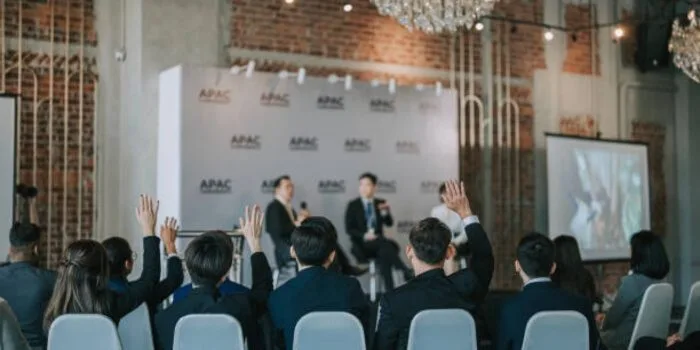The process of obtaining entry permissions varies significantly from one destination to another. This is particularly relevant for professionals and academics planning to attend international conferences. Because of this, the following question often arises: “Is it easy for an American to get a Canadian conference visa?”
Yes, it is relatively easy for Americans to get a Canadian conference visa. The process of visiting Canada for short stays is usually easy for visitors from the United States, who rarely need a visa. However, attending conferences might require an Electronic Travel Authorization (eTA) to simplify travel.
If you plan on crossing the border for a professional or educational gathering, you need to know how the process works. As we cover the details of obtaining the right travel paperwork for your next Canadian conference, keep reading.
Significance of Attending Conferences in Canada
A conference in Canada offers a unique opportunity to learn and grow. At these events, professionals from various fields come together to exchange ideas. This exchange deepens your knowledge and broadens your professional network.

Canada, with its rich culture and innovation-driven sectors, provides the perfect backdrop for such gatherings. Whether you’re attending a global conference in Canada or another professional event, you’re not just gaining knowledge; you’re also experiencing Canadian hospitality and surroundings. It’s an ideal setting to encourage collaboration and spark cross-border innovations.
The conferences you attend can significantly impact your career path and personal development. You can show off your work, receive feedback, and connect with mentors and collaborators. So, setting out on this journey not only builds up your expertise but also boosts your professional standing on the global stage.
Is it Easy for an American to Get a Canadian Conference Visa?
Yes, securing a Canadian conference visa for Americans is typically straightforward. The process is designed to be efficient, reflecting the close ties between Canada and the United States. This ease of access encourages the exchange of knowledge and networking across borders. Below is the detailed explanation of this query:

Electronic Travel Authorization (eTA)
Americans do not need a visa for most conference visits; they only need an electronic travel authorization (eTA). Applying for an eTA is a simple online process. It’s affordable and once approved, it’s valid for five years or until your passport expires. This makes attending multiple conferences over the years easier and hassle-free.
Duration of Stay
Americans can stay in Canada for short periods without a visa, generally up to six months. This period comfortably covers the duration of most conferences. For longer engagements, different rules may apply. Always check the specifics if your conference or visit extends beyond the usual timeframe.
Purpose of Visit
The purpose of your visit should be clear and related to the conference. Documentation proving your attendance, such as registration confirmation, is crucial. This clarity helps streamline your entry into Canada. It also ensures that border officials understand your intentions, facilitating a smoother process.
Preparation and Documentation
Being well-prepared is key to a smooth application process. Ensure your passport is valid and you have all necessary documentation. This includes your eTA confirmation and conference details. A bit of preparation goes a long way in ensuring your travel plans proceed without a hitch.
How Long Does it Take to Get a Canadian Visa For a Conference?
Conference visas can take several weeks to several months to obtain, depending on the conference. The timeline can vary based on the applicant’s country and the time of year. It’s crucial to apply well in advance of your intended travel date to avoid any delays.
Applicants should carefully prepare their documentation, including the conference invitation and any travel itinerary. This preparation can significantly impact the processing speed of your application. Ensuring all forms are filled out correctly and completely is key to a smoother process.
Given the variable processing times, early application is strongly advised. This foresight allows for any unforeseen delays and ensures you can attend your conference stress-free. Remember, patience and organization are your best tools in this process.
Requirements for Americans to Obtain a Canadian Conference Visa
As an American, attending a conference in Canada involves a streamlined process that focuses on ease and efficiency. Due to the friendly ties between the countries, the requirements are simple. Here’s what you need to know to make your journey smooth.
- Valid Passport: Your passport must be valid for the duration of your stay. It’s the primary document for your travel and identification.
- Electronic Travel Authorization (eTA): Americans usually need an eTA rather than a visa for short visits. The application process is online, quick, and simple.
- Conference Registration: Proof of your conference registration confirms the purpose of your visit. This document is essential for your application.
- Travel Itinerary: Submitting your travel plans helps authorities understand the duration and purpose of your stay. It includes flight and hotel bookings.
- Financial Proof: You may need to show you have enough funds for your stay. This ensures you can support yourself during your visit.
- No Criminal Record: A clean criminal history supports your application’s success. It reassures Canadian authorities of your visitor’s suitability.
You can look forward to a successful and enriching conference by preparing properly and attending to these requirements.
Essential Steps for Americans to Get a Canadian Conference Visa
The process of obtaining a Canadian conference visa for Americans is straightforward. The application process involves a series of steps, designed to ensure efficiency and smoothness. Here’s a detailed step guide to help you prepare for your upcoming conference in Canada:
Step 1: Determine the Need for an eTA or Visa
Identify if your trip necessitates an Electronic Travel Authorization (eTA) or a visa. While most Americans attending conferences need just an eTA, longer stays might require a visa. Checking the Canadian government’s official guidelines will clarify which applies to your situation.
Step 2: Apply for an eTA Online
The eTA application is completed on the Canadian government’s official website, a process that’s both efficient and user-friendly. Ensure your passport details are handy, as they’ll be required during the application. The eTA is linked directly to your passport, simplifying airport procedures.
Step 3: Gather Required Documentation
Assemble essential documents, such as your passport, which must be valid for the entirety of your visit, and proof of your conference registration. Additionally, prepare your travel itinerary, including accommodation and return flight details, to demonstrate the purpose and duration of your stay.
Step 4: Complete the Visa Application Form
Accurately fill out the visa application form, available online. This form asks for personal information, travel details, and the purpose of your visit, requiring attention to detail to ensure accuracy and completeness.
Step 5: Pay the Application Fee
The application process includes a fee, payable online or through other specified methods. This fee varies depending on whether you’re applying for an eTA or a visa, so check the current Canadian conference visa cost on the official website.
Step 6: Submit Your Application
Forward your application as directed, which may be through an online submission or at a designated visa application center. Double-check your application and accompanying documents for completeness to avoid unnecessary delays.
Step 7: Await Approval and Plan Your Travel
Once your application is submitted, wait for the approval notification. Approval times can vary, so it’s wise to apply well in advance of your planned travel date. Following approval, you can proceed to book your accommodations and prepare for your conference in Canada.
Following these detailed steps will make it easier for Americans to obtain a Canadian conference visa or eTA. The information provided here will eliminate uncertainty for you, so you can take advantage of the exciting opportunities that await you at your Canadian conference.
Common Difficulties for Americans in Obtaining a Canadian Conference Visa
American conferencegoers generally find the conference registration process straightforward, but they may encounter a few obstacles. Having a better understanding of these common difficulties can boost the application preparation process.
- Misunderstanding eTA and Visa Requirements: Some Americans mix up the need for an eTA versus a visa. This confusion can lead to applying for the wrong one, causing delays.
- Incomplete Applications: Failing to fill out the application completely or accurately is a common issue. This often results in processing delays or requests for additional information.
- Passport Validity: Overlooking passport expiration dates can halt the application process. Your passport must be valid for the duration of your visit.
- Proof of Conference Attendance: Applicants sometimes struggle to provide adequate proof of their conference registration. Without this, verifying the trip’s purpose can be challenging for authorities.
- Financial Proof: Demonstrating sufficient funds for the stay can be problematic for some. Authorities require evidence that you can support yourself during your visit.
- Criminal History or Previous Visa Issues: Criminal records may make applicants more difficult to process. This can complicate or even prevent visa approval, depending on the offense. Additionally, applicants should be aware of the overstaying visa impact on conference visa applications, as previous immigration violations can significantly affect their chances of approval.
By being aware of these common challenges, Americans can raise their chances of a successful application, ensuring a seamless journey to their Canadian conference.
Tips to Overcome These Difficulties
Securing a visa for a Canadian conference doesn’t have to be a daunting task for Americans. By following these practical tips, the process can become more manageable and less prone to common pitfalls.
- Research Thoroughly: Begin by understanding the specific requirements for an eTA versus a visa. Accurate knowledge ensures you apply for the correct authorization, avoiding unnecessary complications.
- Double-Check Applications: Before submission, meticulously review your application for completeness and accuracy. This simple step can significantly reduce processing delays.
- Ensure Passport Validity: Verify that your passport is valid for at least six months beyond your planned stay. Early renewal can prevent last-minute issues.
- Gather Conference Documentation: Secure all necessary documentation for your conference, including registration confirmation and any related correspondence. This strengthens your application by clearly establishing your visit’s purpose.
- Prepare Financial Documents: Compile bank statements or other financial documents early. Demonstrating your financial stability is crucial for a smooth application process.
- Address Criminal History: If you have a criminal record, consult with immigration experts. They can provide advice on how to navigate potential challenges effectively.
By adopting these strategies, Americans can streamline their Canadian visa or eTA application process. These tips are designed to mitigate common issues, ensuring a smoother path to attending your conference in Canada.
Frequently Asked Questions about Is it Easy for an American to Get a Canadian Conference Visa?
An American planning to attend a conference in Canada might have questions about the visa application process. Here are some frequently asked questions to help you figure out how to manage the process smoothly and ensure a successful application.
Do I Need a Visa or An eTA to Attend a Conference in Canada as An American?
Americans typically require an Electronic Travel Authorization (eTA) instead of a visa for short stays, including conference attendance. The eTA process is straightforward and done entirely online.
How Long Is an eTA Valid For, and How Soon Should I Apply?
An eTA is valid for five years or until your passport expires, whichever comes first. It’s advisable to apply for an eTA as soon as your travel plans are confirmed to avoid any last-minute issues.
Can I Extend My Stay in Canada After the Conference Is Over?
Yes, Americans can stay in Canada for up to six months without a visa. If you wish to extend your stay beyond this period, you must apply for an extension before your authorized stay expires.
What if I Have a Criminal Record? Can I Still Attend a Conference in Canada?
Having a criminal record may complicate your entry into Canada. It’s recommended to consult with Canadian immigration services to understand if your specific situation may affect your eligibility for an eTA or require a different type of visa.
Are There Specific Documents I Need to Bring to the Conference in Canada?
Besides having your eTA or visa, you should bring proof of conference registration, a valid passport, and any other documents that support your reason for visiting Canada, such as hotel bookings and a return ticket.
Bottom Line
The journey to attend a conference in Canada as an American is marked by a pathway of clarity and convenience. With smooth processes in place, securing the necessary travel documents becomes a task that is both straightforward and manageable.
This process revolves around the question, “Is it easy for an American to get a Canadian conference visa?” Based on our experience, we can assure you that the transition between the American and Canadian conference visa process will be a smooth one.
This journey not only opens up avenues for professional development but also enriches the traveler with cultural and intellectual exchanges. By following the outlined steps and tips, Americans can look forward to a fulfilling conference experience in Canada, free from the hassles of complex visa requirements.







